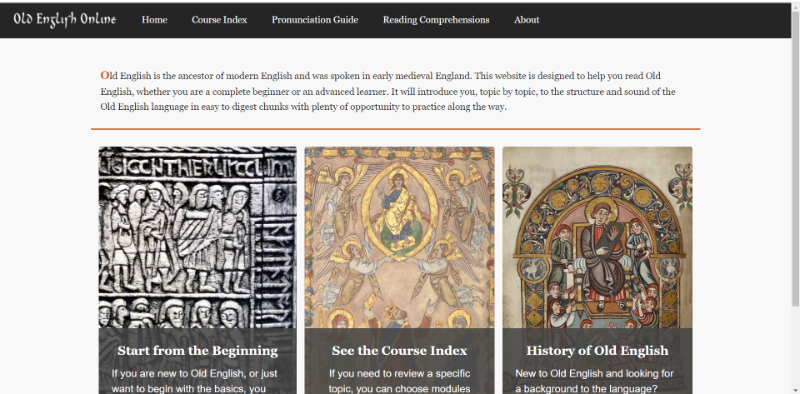- CIRTL Homepage
- Meet our Team
- Resources
- Short Guides
- Short Guide 1: Starting Well
- Short Guide 2: Scaffolding Learning
- Short Guide 3: Icebreakers
- Short Guide 5: Discussions for Online Learning
- Short Guide 4: Visualising Thinking
- Short Guide 6: Universal Design for Learning
- Short Guide 7: Group Work
- Short Guide 8: Reimagining Practicals
- Short Guide 9: Assessment in the Age of AI
- Universal Design for Learning
- CIRTL Series
- Sustainable Development Goals Toolkit
- Learning Design Workshops
- Connected Curriculum
- Group Work
- Civic Engagement Toolkit
- Learning Outcomes
- DigiEd Reading List
- Ethical Use of GenAI Toolkit
- Short Guides
- Professional Development
- Research your Teaching
- Projects
- Events
- Office of the Vice President for Learning & Teaching
Old English Online
Old English Online Language Learning Tool

Explore this page
Project Lead
Dr Tom Birkett, Department of English
Project Team Members
Victoria Koivisto-Kokko, Digital Arts and Humanities
The Teaching Challenge
Old English has been taught at UCC for many years, and we have an international reputation for medieval studies in the College. This translates into classes of up to 150 students each year enrolling to learn what is essentially a foreign language. The Old English course is also particularly popular with visiting students who make up around a third of the cohort in a normal year, with some visiting students even having studied Old English at their home university. The large numbers and vastly different levels of experience with language learning present several challenges. Best practice is to teach language in small groups with a lot of interaction with the tutor. With numbers as high as they are, this method of teaching has become increasingly untenable, and for several years a mix of lectures and tutorials have been offered with little opportunity to cater to different learning styles. In addition, with Old English provision drastically curtailed at many institutions, and opportunities for learning Old English outside academia limited, there is a real risk that early medieval texts will become inaccessible for the majority of students and general public. A digital solution was needed to these challenges – one tailored to teaching Old English at UCC, but that would also be open-access and free for the public to use, addressing a clear institutional and disciplinary need.
The Project
The Old English Online Project sought to develop an existing web-based learning resource into a fully fledged online course, suitable for use by students learning Old English at UCC. The prototype of Old English Online was developed by Victoria Koivisto-Kokko, a former student of Old English at UCC, as part of her MA in Ditgital Arts and Humanities. This prototype sought to apply best practice in online learning and cognitive science of language acquisition to the challenge of teaching Old English at UCC. Koivisto-Kokko has many years of experience in the tech industry, and a collaboration was envisaged that drew on her industry experience and on my knowledge of teaching the language as PI to create a cutting edge platform for online learning. To this end, Old English Online was expanded to mirror the course description and learning outcomes for EN2012, with the inclusion of ‘Test Yourself’ exercises, different levels of tailored feedback, interactive paradigms, hover-over definitions, and a pronunciation guide. Testers were engaged at each stage of the process, and Old English Online was in place for the pivot to online teaching in September 2020 and was successfully used at the primary teaching resource for Old English.
The Impact
The impact of Old English Online student learning has been profound. We used the online platform as the primary resource for language learning in semester 1 of 2020/21, supported by proprietary videos, discussion fora and assessments integrated with Canvas in a hybrid model of teaching. Students indicated in feedback that they appreciated following a course that was accessible to different levels and tailored to be delivered online. In terms of the learner experience, using Old English Online allowed students to progress at their own pace, and ‘gated’ information contributed to this flexibility. Students also appreciated the tailored feedback in the form of quizzes, and the scaffolding of information leading up to assessments. This led to increased student engagement, a much higher rate of completion of the course, higher average marks in the assessments, and – most importantly – less disparity in grades, showing that the course delivered for students with less experience as well as for those with a linguistic background. In addition, engaging with the online resource contributed to the fostering of digital literacy amongst our students, a key strategic goal of the university, whilst regular solicitation of feedback led to greater student involvement in the development of the course.
Collaboration between Koivisto-Kokko and the PI fostered knowledge exchange between participants and across disciplines, as well as representing a model collaboration between academia and industry – another key goal of the university. The impact of the project more widely is also clear from the adoption of Old English Online as a support for teaching in several universities both nationally and internationally. An impressive number of users are viewing and engaging with the course each day, as documented by hits on the website, increasing access to knowledge. This has drawn attention to UCC as a centre for the teaching of Old English, and for our early adoption of digital technologies. Presentation of the project at the annual Teachers of Old English conference in both 2019 and 2020, as well as publication of a project report in the TOEBI Newsletter, has further publicised the resource and brought it to international prominence.
Media

